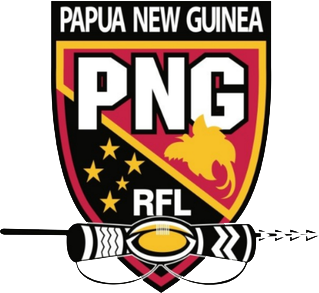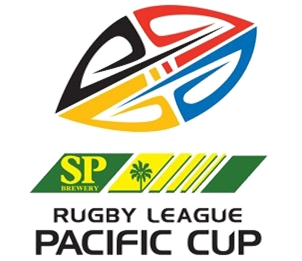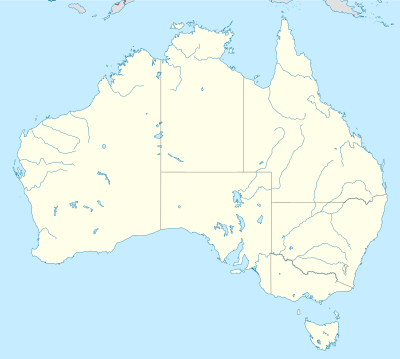
The Papua New Guinea national rugby league team represents Papua New Guinea in the sport of rugby league football.

The International Rugby League (IRL) is the global governing body for the sport of rugby league football. Previously known as the Rugby League Imperial Board, the International Rugby League Board and latterly the Rugby League International Federation, the IRL is responsible for the Laws of the Game, the development, organisation and governance of rugby leagues internationally, and for the sport's major international tournaments; most notably the Rugby League World Cup.

The Tonga national rugby league team represents Tonga in rugby league football. They are currently the second ranked team in the world. The team was formed to compete in the 1986 Pacific Cup, and have competed at six Rugby League World Cups, starting in 1995 and continuing consecutively until the most recent tournament. Their best result was at the 2017 Rugby League World Cup, where they were semi-finalists.

The 2013 Rugby League World Cup was the fourteenth staging of the Rugby League World Cup and took place in England, Wales, France and Ireland. between 26 October and 30 November 2013.
The Women's Rugby League World Cup is an international rugby league tournament, contested by the women's national team of the International Rugby League (IRL). The competition has been held since 2000 in Great Britain and since 2008 has been part of the Festival of World Cups. Under the current format, eight teams are separated into two groups of four with the top two qualifying for the semis.

The Rugby League World Cup is an international rugby league tournament contested by the top national men's representative teams. The tournament is administered by the International Rugby League and was first held in France in 1954, which was the first World Cup held for any form of rugby football.

The Festival of World Cups was a series of rugby league World Cups held in Australia during 2008. The Festival was being staged in Australia during 2008 to coincide with their Centenary of Rugby League celebrations. The centrepiece of the Festival was the men's 2008 Rugby League World Cup. In addition to this tournament, there were also world cups being held for University, Police, Women, Defence and Wheelchair teams.
The Rugby League Four Nations was a rugby league football tournament run in partnership between Australia, England, New Zealand, and a guest nation which change with every edition.

The 2009 Pacific Cup, known as the 2009 SP Brewery Pacific Cup due to sponsorship, was a rugby league competition held in Port Moresby, Papua New Guinea. The competing teams were the Cook Islands, Fiji, Papua New Guinea, Samoa, Tonga.

The 2017 Rugby League World Cup was the fifteenth staging of the Rugby League World Cup tournament and took place in Australia, New Zealand and Papua New Guinea between 27 October and 2 December 2017. The tournament featured the national teams of 14 Rugby League International Federation member countries who qualified through either standing in the previous tournament or a series of qualification play-off matches. In the final, defending champions Australia, playing in their 14th consecutive final, defeated England at Brisbane's Lang Park.
The England women's national Rugby League team represents England in Women's Rugby League. They are administered by the Rugby Football League. As Great Britain, they toured Australia in 1996, New Zealand in 1998, and reached the first-ever Women's Rugby League World Cup final in 2000, where they lost 26–4 to New Zealand.

The 2021 Men's Rugby League World Cup, was the 16th Rugby League World Cup, and one of three major tournaments of the 2021 Rugby League World Cup. The tournament was held in England from 15 October 2022 to 19 November 2022. It was originally due to be held between 23 October 2021 and 27 November 2021, but the COVID-19 pandemic and the subsequent withdrawals of Australia and New Zealand caused the tournament to be postponed. 16 teams competed in the tournament, an increase of two from the previous two tournaments and the first to feature 16 teams since the 2000 Rugby League World Cup.
The 2017 Women's Rugby League World Cup was the fifth staging of the Women's Rugby League World Cup and was held in Australia between 16 November and 2 December 2017. Pool and semi-final matches was held at Southern Cross Group Stadium in Sydney, with the final held at Brisbane Stadium. The final was played as a double-header with the men's final.
The 2017 Rugby League World Cup final was a rugby league match to determine the winner of the 2017 Rugby League World Cup, played between reigning champions Australia and their rivals England on 2 December 2017 at Brisbane Stadium in Brisbane, immediately after the final of the concurrent women's competition.

The 2019 Oceania Cup was the inaugural edition of the Oceania Cup. Contested by six teams, the competition began in June and concluded in November.
A list of men and women international rugby league matches played throughout 2019 and does not include wheelchair rugby league international matches. A † denotes a recognised, but unofficial match that did not contribute to the RLIF World Rankings.
The 2021 Women's Rugby League World Cup was the sixth staging of the Women's Rugby League World Cup, and was be one of three major tournaments part of the 2021 Rugby League World Cup. The tournament was held in England from 1 November to 19 November 2022. Originally planned for 2021, it was delayed a year along with the men's and wheelchair tournaments due to the COVID-19 pandemic. The tournament featured eight teams, an increase of two from the previous tournament.
The Rugby League World Cup is an international rugby league tournament currently played every four years. The first tournament was held in 1954, hosted by France who had pushed for such a tournament to be approved. Since the first edition, 14 others have been held at sporadic intervals.

The 2021 Rugby League World Cup (RLWC2021) was a collection of world cups in the sport of rugby league, held in England from 15 October to 19 November 2022.

The 2021 Rugby League World Cup final was the rugby league match to determine the winner of the 2021 Rugby League World Cup, played between Australia and Samoa on 19 November 2022 at Old Trafford in Manchester, England.




























